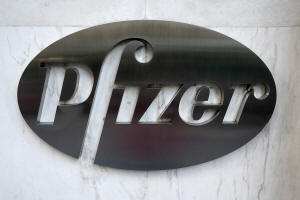US CDC backs Pfizer's maternal RSV vaccine to protect infants
 Send a link to a friend
Send a link to a friend
 [September 23, 2023]
By Sriparna Roy and Michael Erman [September 23, 2023]
By Sriparna Roy and Michael Erman
(Reuters) -The U.S. Centers for Disease Control and Prevention (CDC) on
Friday backed Pfizer's respiratory syncytial virus (RSV) vaccine for
women in the middle of the third trimester of pregnancy to protect their
babies from severe illness.
The CDC recommendation comes after a panel of advisers voted 11 to 1 for
use of the shot in women 32 weeks to 36 weeks into their pregnancy from
September to January, paving the way for it to become the first maternal
vaccine for the seasonal respiratory virus available in the country.
“This is another new tool we can use this fall and winter to help
protect lives,” CDC Director Dr. Mandy Cohen said in a statement.
The vaccine was approved by the U.S. Food and Drug Administration last
month for use during that same window of 32 to 36 weeks into pregnancy
to prevent lower respiratory tract infection and severe disease in
infants until they are six months old.
"RSV throughout my career has been a difficult disease with just
supportive care treatment because there have been no options so today is
an exciting day," said Dr. Katherine Poehling, a member of the CDC
advisory panel and a professor of pediatrics and epidemiology and
prevention at Wake Forest School of Medicine.

Getting the vaccine late in pregnancy is likely to reduce a possible
risk of preterm births and complications that might arise from taking it
earlier, doctors on the panel said.
RSV is a common respiratory virus that usually causes mild, cold-like
symptoms but can also lead to serious illness and hospitalization. It is
typically a seasonal illness, starting in autumn and peaking in the
winter in most of the U.S., according to the CDC.
Because RSV is a seasonal disease, "year round administration could not
benefit children born in April through September," panel member Dr.
Sarah Long, professor of pediatrics at Drexel University College of
Medicine said.

[to top of second column]
|

The Pfizer logo is pictured on their headquarters building in the
Manhattan borough of New York City, New York, U.S., November 9,
2020. REUTERS/Carlo Allegri/File Photo
 If needed, those babies could
receive Sanofi and AstraZeneca's antibody therapy nirsevimab to
prevent RSV in infants and toddlers, which was approved earlier this
year, she said.
An estimated 58,000 to 80,000 children below the age of five years
are hospitalized each year due to RSV infection in the U.S.,
according to government data.
Pfizer's vaccine, along with another made by GSK, won U.S. approval
in May for use in people age 60 and older and are already available
around the country.
Pfizer said the list price of the maternal shot will be $295 per
dose, the same as for older adults. It plans to use a tiered pricing
strategy for the shot outside of the U.S.
At an advisory meeting in May, FDA staffers had flagged a higher
number of pre-term births among participants taking Pfizer's vaccine
in a clinical trial compared to those who received a placebo.
However, the agency said the difference did not appear to be
statistically significant, thus might have been due to chance.
A surge in cases of RSV infections coinciding with an increase in
COVID transmission and an earlier-than-normal flu season has raised
the specter of a so-called 'tripledemic' of respiratory illness
across the United States.
CDC has said it expects total hospitalizations from the three to be
similar to last year.
For the first time, vaccines to protect against all three diseases
will be available this autumn, the government health agency said.
(Reporting by Sriparna Roy and Mariam Sunny in Bengaluru; Editing by
Bill Berkrot)
[© 2023 Thomson Reuters. All rights
reserved.]This material may not be published,
broadcast, rewritten or redistributed.
Thompson Reuters is solely responsible for this content. |